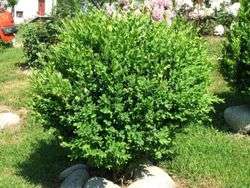llwyn
Welsh

llwyn
Noun
llwyn m (diminutive llwynyn, plural llwynau or llwyni or llwynydd)
Etymology 2
Borrowed from Old French loigne or Middle English loyne.
Noun
llwyn m or f (plural llwynau or llwyni)
Alternative forms
- lwyn
Mutation
| Welsh mutation | |||
|---|---|---|---|
| radical | soft | nasal | aspirate |
| llwyn | lwyn | unchanged | unchanged |
| Note: Some of these forms may be hypothetical. Not every possible mutated form of every word actually occurs. | |||
References
- R. J. Thomas, G. A. Bevan, P. J. Donovan, A. Hawke et al., editors (1950-), “llwyn”, in Geiriadur Prifysgol Cymru Online (in Welsh), University of Wales Centre for Advanced Welsh & Celtic Studies
This article is issued from
Wiktionary.
The text is licensed under Creative
Commons - Attribution - Sharealike.
Additional terms may apply for the media files.